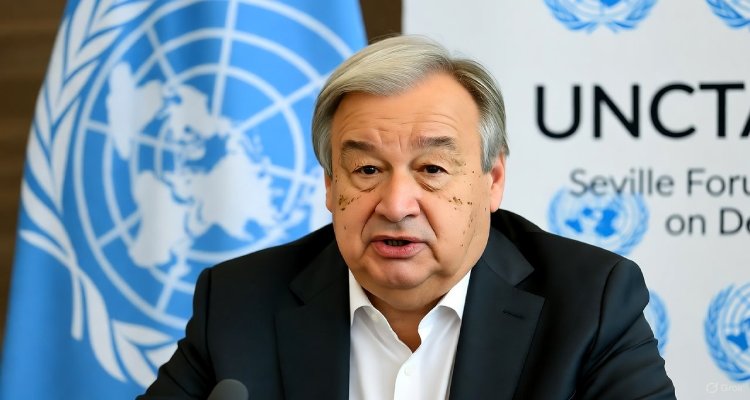Launch of the Seville Forum on Debt Marks a New Era in Global Financial Governance

UN Secretary-General António Guterres launches the Seville Forum on Debt, a new global initiative to reform debt governance and foster inclusive dialogue on development financing.
Introduction: A Turning Point for Global Debt Reform
In a world burdened by record-high public debt, the United Nations has launched a bold initiative aimed at reshaping how nations confront financial crises. On October 22, during the 16th United Nations Conference on Trade and Development (UNCTAD16) in Geneva, UN Secretary-General António Guterres announced the creation of the Seville Forum on Debt—a landmark platform designed to address the growing complexities of global debt.
The launch marks one of the first tangible outcomes of the Fourth International Conference on Financing for Development (FfD4) and signals a renewed international effort to build fairer, more sustainable financial systems.
Context & Background: The Debt Dilemma Deepens
Global debt levels have reached alarming heights. By the end of 2024, total public debt soared to $102 trillion, the highest in history. Developing countries alone hold $31 trillion of that sum, paying $921 billion in interest in the same year.
UNCTAD warns that nearly 3.4 billion people now live in nations that spend more on debt servicing than on healthcare or education. The figures paint a stark picture: debt is no longer just an economic issue—it’s a developmental crisis.
Over the past decade, global leaders have called for reforms to the international debt architecture, which remains fragmented, unpredictable, and often tilted against developing economies. The Seville Forum now seeks to convert these long-standing calls into actionable global cooperation.
Main Developments: Birth of the Seville Forum on Debt
The Seville Forum on Debt, announced under the Seville Platform for Action, is a Spanish-led initiative supported by UNCTAD and the UN Department of Economic and Social Affairs (UN DESA). It builds upon the Seville Commitment—a roadmap adopted at FfD4 to strengthen development financing and reform debt management systems.
Unlike traditional financial institutions, the Seville Forum is envisioned as an open, inclusive platform that brings together developed and developing nations, finance ministers, creditors, and civil society to engage in constructive dialogue. Its purpose is twofold: to sustain political momentum on debt reform agreements and to develop technical pathways for implementing responsible lending and borrowing practices.
Spain will host and support the forum, working closely with the UN to design its structure, agenda, and operational framework.
Expert Insight: “A Long-Overdue Conversation”
UN Secretary-General António Guterres described the forum as “a crucial mechanism to translate political commitments into real-world impact.” He emphasized that “debt relief and responsible financing are not acts of charity—they are investments in global stability.”
Economists have long argued that the international debt system disproportionately penalizes developing nations, often forcing austerity measures that hinder growth and social welfare. According to Dr. Rebeca Grynspan, Secretary-General of UNCTAD, the Seville Forum “creates a space for meaningful dialogue between borrowers and lenders, allowing countries to pursue development without being trapped by unsustainable debt.”
Financial experts view this initiative as a practical step toward reforming the global financial architecture, offering transparency, shared responsibility, and coordinated solutions.
Impact & Implications: Toward Fairer Global Finance
The Seville Forum’s establishment could reshape how the world manages debt crises. It aims to:
- Encourage responsible lending and borrowing by establishing shared principles and standards.
- Facilitate debt restructuring dialogues between creditors and debtor nations.
- Promote innovative solutions, including debt-for-climate swaps and sustainability-linked instruments.
- Support developing countries in aligning debt management with the UN’s Sustainable Development Goals (SDGs).
The forum also serves as a permanent mechanism to monitor progress on commitments made at Seville, ensuring that debt discussions remain high on the global political agenda.
If successful, it could reduce dependency on ad-hoc negotiations and fragmented debt relief measures—issues that have historically slowed recovery in vulnerable economies.
The Broader Challenge: A System in Need of Renewal
Debt relief has been a recurring theme in global development debates since the early 2000s. Yet, despite multiple initiatives—from the Heavily Indebted Poor Countries (HIPC) initiative to the G20 Common Framework—progress has been uneven and slow.
With today’s mounting debt levels, particularly in low-income nations facing climate and humanitarian crises, the global community faces a pressing need to rethink how financial resilience is built.
The Seville Forum represents a move from reactive to proactive governance—from crisis management to systemic reform.
Conclusion: From Commitments to Concrete Action
The launch of the Seville Forum on Debt stands as a milestone in the quest for equitable global finance. By institutionalizing the principles of the Seville Commitment, the UN and its partners are signaling that the world’s debt problem requires sustained, inclusive collaboration—not piecemeal fixes.
As consultations begin on the forum’s structure, the international community will watch closely to see whether this initiative can deliver on its promise: transforming words of solidarity into structures of accountability.
For billions living under the weight of unsustainable debt, the Seville Forum may well represent the start of a new chapter—a chapter where global finance finally serves global development.
Disclaimer: This article is for informational and analytical purposes only. It does not represent the views of the United Nations or any affiliated organizations.










